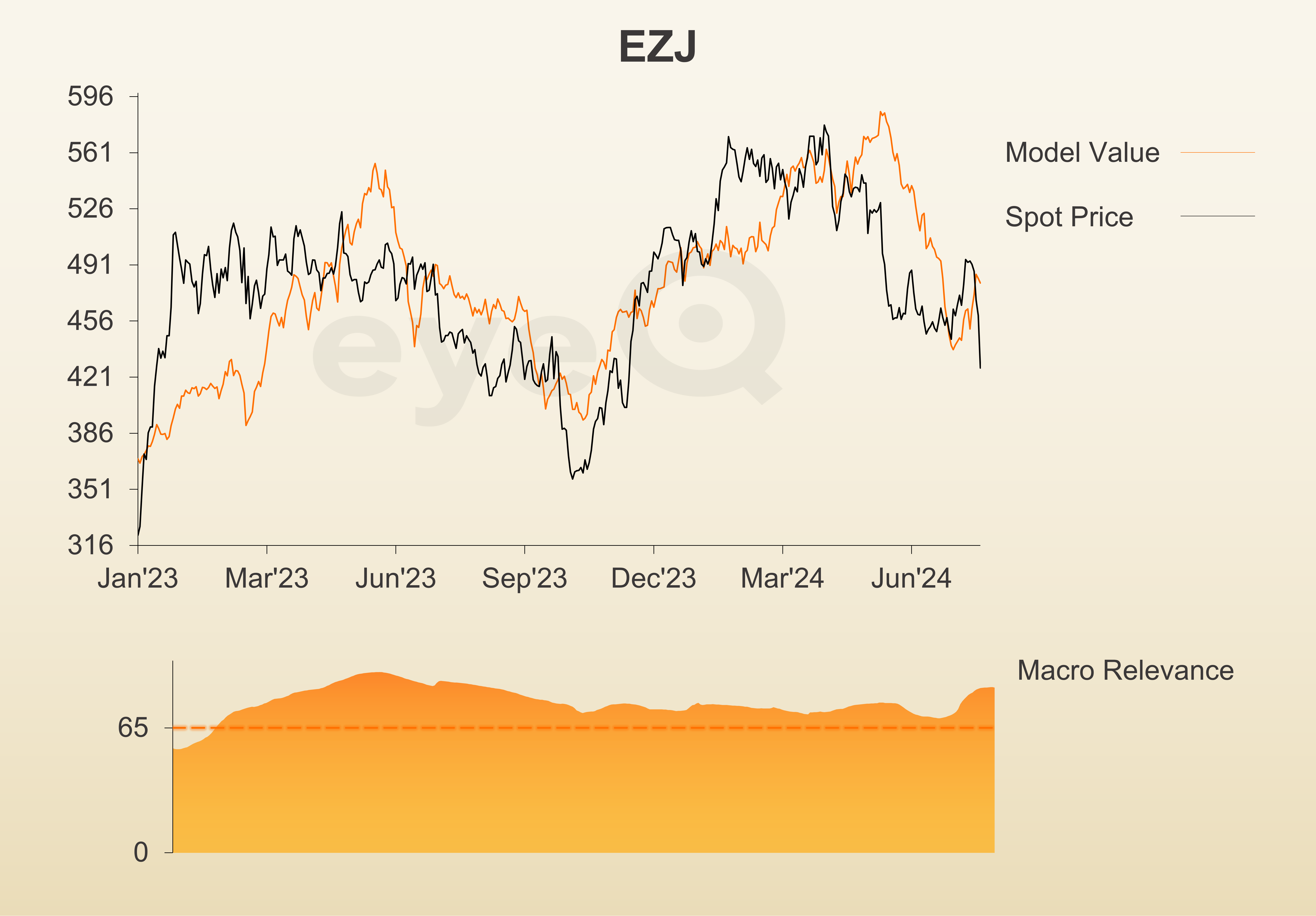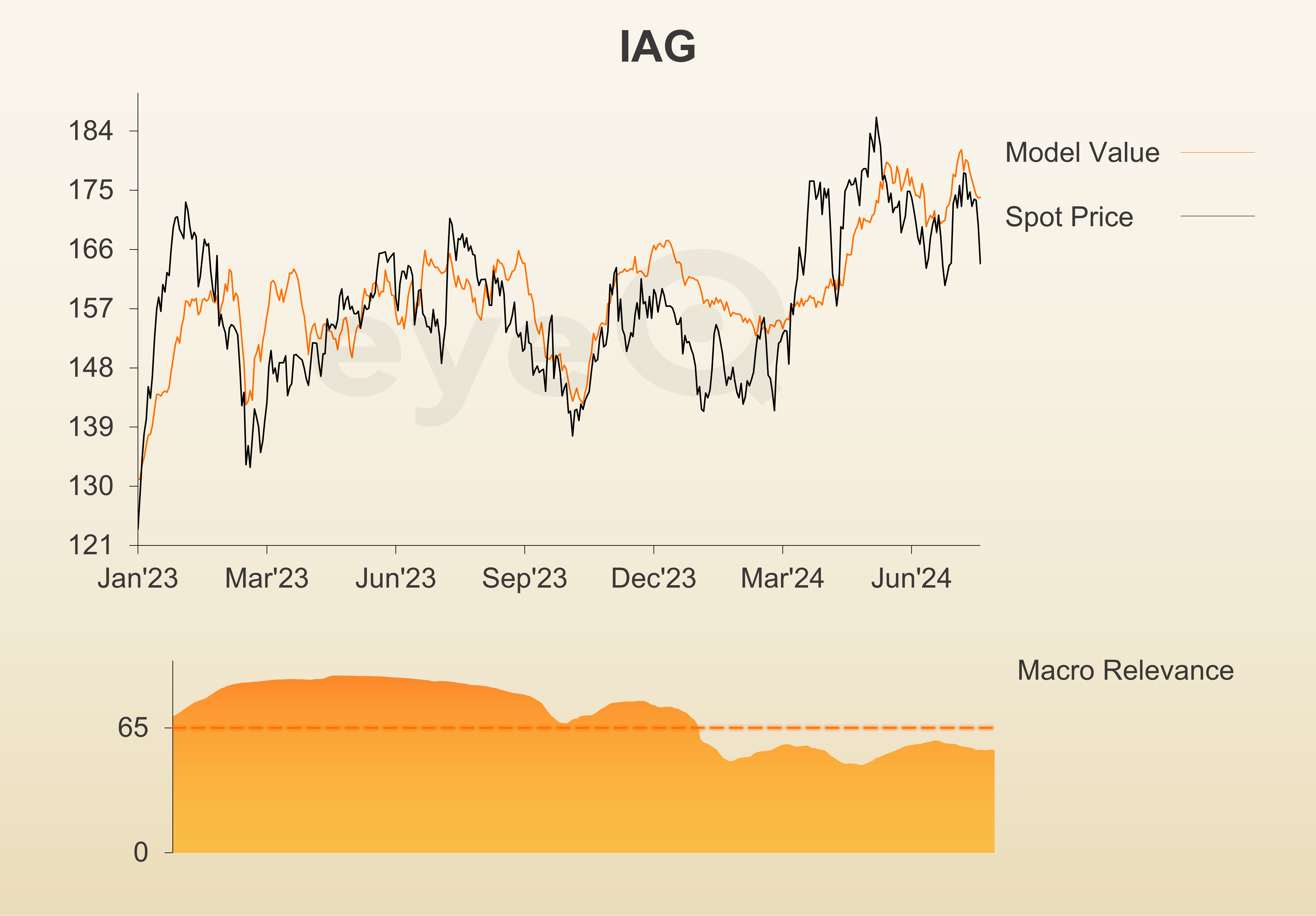eyeQ: is slump at easyJet and IAG a buying opportunity?
Experts at eyeQ have used AI and their own smart machine to analyse macro conditions and generate actionable trading signals. This is what it says about downbeat airline stocks.
23rd July 2024 08:46
by Huw Roberts from eyeQ

"Our signals are crafted through macro-valuation, trend analysis, and meticulous back-testing. This combination ensures a comprehensive evaluation of an asset's value, market conditions, and historical performance." eyeQ
- Discover: eyeQ analysis explained | eyeQ: our smart machine in action | Glossary
easyJet
Trading signal: long-term strategic model
Model value: 479.30p
Fair Value Gap: -12.43% discount to model value
Model relevance: 86%
Data correct as at 23 July 2024. Please click glossary for explanation of terms.
End of an era?
Yesterday, Ryanair shares fell hard after the company announced a profit warning. The airline said fares would be “materially lower” as consumers have become more cautious with their travel plans. Does this signal the end of the post-Covid lockdown period of “revenge travel” when consumers were happy to splash the cash on experiences rather than goods?
The markets appear to fear that. Both British Airways owner International Consolidated Airlines Group SA (LSE:IAG) and easyJet (LSE:EZJ) share prices fell hard too.
But this is exactly where eyeQ’s smart machine can help. If economic growth is slowing and is a big drag on the share price, our algorithm captures this relationship.
Moreover, it can measure where the stock ‘should’ trade given the macro picture including things like how strong or weak the economy is, or how inflation is impacting the cost-of-living crisis.
In the case of easyJet, macro really matters. The bottom chart shows how high and stable our macro relevance score is. And the top chart shows how between mid-May and the end of June, economic growth was a big drag, pulling our model value 22% lower. But look at July. Model value has bounced 5%.
This latest sell-off has ignored the fledgling signs of a recovery, and that leaves easyJet 12.43% cheap to overall macro conditions. It’s very close but it’s not quite enough yet to trigger a bullish signal.

Source: eyeQ. Past performance is not a guide to future performance.
IAG
Trading signal: long-term strategic model
Model value: 174.28p
Fair Value Gap: -6.14% discount to model value
Model relevance: 53%
Data correct as at 23 July 2024. Please click glossary for explanation of terms.
It’s a similar story with IAG, but the health warning here is 53% macro relevance, meaning the British Airways’ stock price is moving more on company news than big picture stuff such as growth and inflation.
So, in short, company news is important. Lower airfares imply lower profits and that cannot be ignored. And if you believe a recession is coming, this bounce in the economic data in July is just a “blip” which won’t last.
But we’ll be watching the orange line in these charts very closely in the weeks ahead. If macro fundamentals do hold up, then some value is starting to build here and our smart machine may flag a decent buying opportunity.

Source: eyeQ. Past performance is not a guide to future performance.
Useful terminology:
Model value
Where our smart machine calculates that any stock market index, single stock or exchange-traded fund (ETF) should be priced (the fair value) given the overall macroeconomic environment.
Model (macro) relevance
How confident we are in the model value. The higher the number the better! Above 65% means the macro environment is critical, so any valuation signals carry strong weight. Below 65%, we deem that something other than macro is driving the price.
Fair Value Gap (FVG)
The difference between our model value (fair value) and where the price currently is. A positive Fair Value Gap means the security is above the model value, which we refer to as “rich”. A negative FVG means that it's cheap. The bigger the FVG, the bigger the dislocation and therefore a better entry level for trades.
Long Term model
This model looks at share prices over the last 12 months, captures the company’s relationship with growth, inflation, currency shifts, central bank policy etc and calculates our key results - model value, model relevance, Fair Value Gap.
These third-party research articles are provided by eyeQ (Quant Insight). interactive investor does not make any representation as to the completeness, accuracy or timeliness of the information provided, nor do we accept any liability for any losses, costs, liabilities or expenses that may arise directly or indirectly from your use of, or reliance on, the information (except where we have acted negligently, fraudulently or in wilful default in relation to the production or distribution of the information).
The value of your investments may go down as well as up. You may not get back all the money that you invest.
Equity research is provided for information purposes only. Neither eyeQ (Quant Insight) nor interactive investor have considered your personal circumstances, and the information provided should not be considered a personal recommendation. If you are in any doubt as to the action you should take, please consult an authorised financial adviser.
Disclosure
We use a combination of fundamental and technical analysis in forming our view as to the valuation and prospects of an investment. Where relevant we have set out those particular matters we think are important in the above article, but further detail can be found here.
Please note that our article on this investment should not be considered to be a regular publication.
Details of all recommendations issued by ii during the previous 12-month period can be found here.
ii adheres to a strict code of conduct. Contributors may hold shares or have other interests in companies included in these portfolios, which could create a conflict of interests. Contributors intending to write about any financial instruments in which they have an interest are required to disclose such interest to ii and in the article itself. ii will at all times consider whether such interest impairs the objectivity of the recommendation.
In addition, individuals involved in the production of investment articles are subject to a personal account dealing restriction, which prevents them from placing a transaction in the specified instrument(s) for a period before and for five working days after such publication. This is to avoid personal interests conflicting with the interests of the recipients of those investment articles.